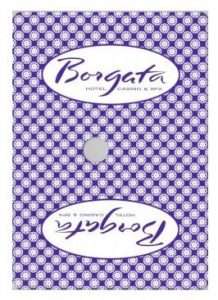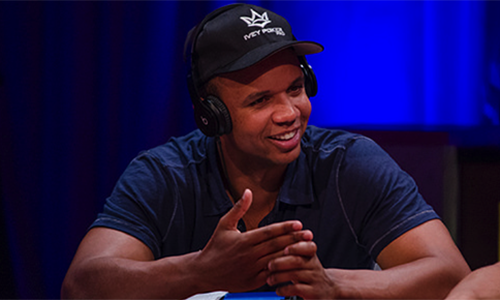Phil Ivey’s Edge Sorting Gambit Wasn’t Cheating
Phil Ivey is one of the greatest poker players of all time; he was recently recognized as such with his induction into the Poker Hall of Fame. He was also labeled as a casino cheater this week by the British Supreme Court. That is probably a tough pill for him to swallow, but I am here to defend Phil Ivey’s honor (boy that sounds stupid) and declare that no, he did not cheat, even if he is a supreme angle-shooter.
Let’s review what he and his accomplice, Cheung Yin Sun, did at both Crockfords casino in London and the Borgata in Atlantic City. They played a high stakes game of punto banco, a common version of baccarat, in which the “banker” and “player” are each dealt two cards with the goal of achieving a total hand value as close to nine as possible (tens and face cards count as zero). Like in blackjack, each side can draw more cards.

A sample “Purple Gem” Borgata card, similar to that in the 2012 mini-baccarat games involving Phil Ivey.
Ivey and Sun had noticed prior to their winning runs at the casinos that the games used miscut purple Gemaco decks. The significance of this was that the normally symmetrical pattern on the card backs was now subtly asymmetrical, very difficult to detect.
With that knowledge, Ivey requested that every time an eight or nine was dealt (these are the key cards in the game), that the dealer rotate it 180 degrees before returning it to the shoe. The automatic shuffler didn’t change the orientation of the cards, so Ivey and Sun were able to see when the top card was an eight or nine because the card back pattern was off. The casino also granted their request to use the same decks on subsequent days, thus keeping the rotated cards in play.
A game which was now purely luck (aside from basic strategy, like in blackjack) was now tilted significantly toward Ivey and Sun.
The casinos and the courts all believe that what Ivey and Sun did was cheating. Supreme Court Judge Anthony Hughes called it “a carefully planned and executed sting,” which it was.
He also said, “If he had surreptitiously gained access to the shoe and re-arranged the cards physically himself, no one would begin to doubt that he was cheating. He accomplished exactly the same result through the unwitting but directed actions of the croupier, tricking her into thinking that what she did was irrelevant.”
Ehhhh…mayyyybeeee. But is it cheating? I don’t think so. Don’t get me wrong: I would never cheat and look down my nose at anyone who does, but I don’t think any less of Phil Ivey for the scheme he ran on Crockfords and Borgata.
All Ivey did was make requests of the casino and of the dealer. They in no way had to honor them. The casino didn’t have to up the stakes of the games for Ivey. The casino didn’t have to let him use the same decks day-to-day. The dealer certainly did not have to rotate any cards and the casino didn’t have to let that happen.
The casinos also didn’t have to use miscut cards.
Look, Phil Ivey didn’t force the casino or dealers to do anything. The only influence he used was his money. He promised to wire money in advance and wager millions of dollars on their gaming floors if the casino granted his wishes. He wanted to win money.
And guess what? The casinos were probably licking their figurative chops when Ivey called and said he wanted to give them a metric butt ton of business. The casinos know they have the advantage over the player. They likely welcomed Ivey and Sun with open arms.
“Sure, we’ll let you use the same deck the next day! Superstition? Sounds great! Take our mega-elite-presidential-grand-sultan suite!”
Phil Ivey found a way to give himself an edge and the casinos let him. He wasn’t particularly sneaky about it, either. He said, “Hey, change the game by doing this, this, this, and that for me,” and the casinos did.
Who cares that he wasn’t open and honest about WHY he wanted what he wanted? Who would ever admit to the casino that he was trying to gain an advantage on the casino? He doesn’t have to tell the truth about his intentions – he’s not under oath in a court of law. The casinos wanted his money, so they let him do what he wanted.
It’s their own damn fault. Phil Ivey played the punto banco game by the rules upon which both he and the casinos agreed. That he saw there was a problem with the cards is – in my mind, at least – beside the point. If you were playing blackjack in a casino and noticed the dealer was inadvertently exposing the corner of one of his cards every hand, would you speak up? I doubt it. You would internally scream with joy and try to win as much money as possible.
Phil Ivey may have used his status and large bankroll to take advantage of the casino, but the casino was trying to do the same thing to him. This time, the casino lost and just couldn’t deal with it.



















Regarding your comment: “Who cares that he wasn’t open and honest about WHY he wanted what he wanted? Who would ever admit to the casino that he was trying to gain an advantage on the casino? He doesn’t have to tell the truth about his intentions – he’s not under oath in a court of law. ” — actually, that’s not exactly true in the UK about “Private Club” gaming laws. While I was not happy with the decision in the UK, there is a legal basis. We did a short article on the legal analysis on TravelZork.
(link removed)